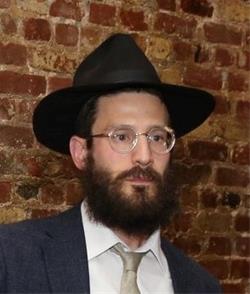Known for his boundless spirit and perpetual smile, with always an encouraging word for others, Rabbi Avrohom Shmuel Bukiet was a scholar, educator and mashpia (mentor) who served as a source of inspiration for anyone who met him. Described as “without ego” and one who “didn’t need anything for himself,” Bukiet was famous for his rousing weekly farbrengens (Chassidic gatherings) in Kfar Chabad, Israel, that would warm the spirit and uplift even the most downtrodden. He passed away on Feb. 17 after a battle with the coronavirus. He was 70 years old.
Always positive and eminently approachable, Bukiet coupled his jovial spirit with sophisticated erudition, authoring nearly 50 books and serving on the spiritual advisory board of the village of Kfar Chabad, where he lived.
Young Avrohom Shmuel, or “Avrumie,” as he was called by so many, was born in 1951 in Brooklyn, N.Y., to Rabbi Chaim Meir and Esther Bukiet, who named him after a grandfather who perished in World War II. His father was one of a group of Chabad yeshivah students from Poland who fled to Shanghai in the early years of the war. As a result of his escape, Rabbi Chaim Meir was the sole survivor of his family.
A staunch follower of the Sixth Rebbe—Rabbi Yosef Yitzchak Schneersohn, of righteous memory—and then of the Rebbe—Rabbi Menachem M. Schneerson, of righteous memory—Rabbi Chaim Meir and with his wife imbued a strong Chassidic spirit in their home, one that would stay with Avrohom Shmuel his entire life. In those days, the Chabad-Lubavitch yeshivah was on the colloquially named street corner of “Bedford and Dean” in the northern section of Crown Heights, and it was there that young Avrohom Shmuel first experienced his Chassidic education.
“Avrumie was a very lively and adventurous young kid,” says a brother, Rabbi Levi Bukiet. “He was never timid or afraid, and always active. He was a lot of fun in those early school days.”
As he blossomed into a thoughtful young man, his parents sent him off to study in the Chabad yeshivah in Montreal under the guidance of the legendary mashpia Rabbi Zev Wolf Greenglass, or “Reb Volfe,” as he was affectionately known. “Reb Volfe was hugely instrumental in his life, and he always considered him as his personal mentor,” says Levi Bukiet. Avraham Bukiet would credit two other figures for their guidance and education—namely, Rabbi Isaac Schwei, the Rav and Rosh Yeshivah in Montreal, as well as Rabbi Pinchas Korf, a community mashpia and educator in Brooklyn.
After graduating from the yeshivah in Montreal, Bukiet returned to his native Brooklyn to continue his studies in the central Chabad-Lubavitch yeshivah at 770 Eastern Parkway. After receiving his rabbinic ordination in 1976, he married Feiga Bracha Wilhelm of Jerusalem.
Dispatched to Israel

In the mid to late-1970s, the Rebbe sent three waves of special envoys to Israel to strengthen Judaism in Israel. Bukiet was privileged to be in the third and final group that was sent in 1978, a privilege and responsibility of which he was always extremely proud, and one that he carried out with never-ending enthusiasm.
The Bukiets first settled in the city of Safed and then served as an emissary in the Chabad center in Kiryat Ata. In later years, they settled in the village of Kfar Chabad, where he made an indelible mark on the Chabad community and beyond. Bukiet served as a mashpia at Yeshiva Ohr Simcha and then Yisroel Aryeh Leib Shul, called the “Miklat,” where he would farbreng every Shabbat afternoon.
“He was always available to farbreng and led an encouraging word,” said Rabbi Shmuel Greisman, who directs the Children’s Torah Scroll project out of Jerusalem. “He would constantly be speaking about the right things and never about himself.”
“I was his neighbor for 25 years,” says Rabbi Yami Lifschitz, who serves as deputy director of the Sdot Dan Regional Council, the governing municipality of Kfar Chabad. “What can I tell you? Everyone loved him. He never needed anything for himself, the ultimate embodiment of true Ahavat Yisrael. The entire Kfar is in the dumps right now without him.”
Bukiet’s unique ability to connect with anyone—from the greatest scholar to the most ordinary of people—was legendary. “I recall one Shabbat afternoon we were sitting in the synagogue, and there were some young men outside who were engaging in activities that can be considered disrespectful of Shabbat,” relates his brother Levi. “While others clucked in disapproval, Avrumie told them not to say anything disparaging about a Jewish child and proceeded to approach them. I don’t know what he told them, but after a few moments, they were chatting together, laughing and hugging. He could shoot the breeze with anyone and hold a sophisticated scholarly discussion with the best of them, too.”

A Popular Author of Chassidic Works
Bukiet was particularly enthusiastic about bringing Chassidic teachings to as broad an audience as possible, and to that end, authored many books that collected, organized and expanded on the abundance of Chassidic work available. One of his personal favorites was the famed Tanya, a work he passionately taught for many years, and on which he authored a number of books himself.
In all, he wrote almost 50 books.
Reported as one who “maintained the same energy throughout his entire life, approaching his shlichut as if it was the first day he got there,” Bukiet seemingly never tired, increasingly taking on additional projects. As a lover of people, he was keen on bringing people together and mending any sort of rift between friends. In particular, the “family” of shluchim who were sent in those three waves to Israel were very close to his heart.
“One of the things you would always hear Avrumie say was that ‘All the shluchim are my brothers.’ Indeed, he would attend every personal family simchah, a smiling face at every wedding of the family of shluchim,” said Rabbi Greisman.
In this spirit, Bukiet was an integral part of the Iggud Hashluchim Le’Eretz Hakodesh—“Joint Organization of the Shluchim to Israel.”
One of the projects of this organization that Bukiet was intimately involved with was the yearly kinus (conference) of Chabad emissary families in Israel. A small project that began annually in 1981, it quickly became an annual highlight for the families who attended.

As it developed, Rabbi Bukiet was brought on board together with Rabbi Yehudah Eidelkop to work on the program and other details. Each year, he would secure a place for all the many families to gather together and strengthen each other in their collective mission. The Rebbe took a keen interest in these gatherings, sending special letters over the years that even paid close attention to the location of the gathering—down to the street number of the facility. The Rebbe was very gratified that it was a kinus of families in particular—men, women and children—and that was something Bukiet worked very hard to put in place.
“He was the spirit of the kinus,” affirmed Greisman.
The importance of these relatively smaller gatherings can be seen in hindsight, as they were the inspiration for similar events, including the now international conference that draws many thousands to Brooklyn.
Back at home in Kfar Chabad, Bukiet’s influence continued to grow, and in 2017, he was appointed to the village’s spiritual advisory board by its chief rabbi, the late Rabbi Mordechai Shmuel Ashkenazi. In that capacity, he directed much of the spiritual atmosphere of the growing village.
After contracting the coronavirus, people from all over the country rallied to pray for his recovery. He passed away just a day after his 70th birthday.
In addition to his wife, he is survived by their children: Rabbi Shneur Zalman Bukiet (Zhytomyr, Ukraine); Rabbi Yisrael Bukiet (Brazil); Rabbi Shalom Yaakov Bukiet (Haifa, Israel); Chaya Sara Mann (Kfar Chabad, Israel); Rabbi Yechiel Dovid Bukiet (Kfar Chabad); and Rabbi Asher Bukiet (Kfar Chabad); in addition to many grandchildren.
He is also survived by his siblings, Ruchie Stillman (Tarzana, Calif.); Rabbi Yossi Bukiet (Los Angeles); Rabbi Levi Bukiet (Chicago); Chaye Bukiet (Brooklyn, N.Y.); Rabbi Alti Bukiet (Lexington, Mass.); Sarah Kramer (Montreal); and Rabbi Zalman Bukiet (Boca Raton, Fla.).










Join the Discussion